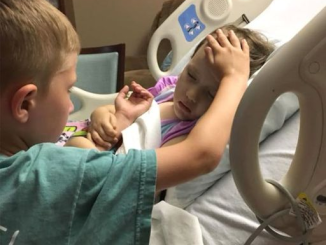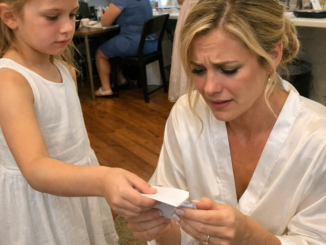
It was supposed to be just a public event.
No alarms. No chaos. Just smiles, high-fives, and juice boxes. I was kneeling on the pavement, taking a photo with my kids—Rory kissed my cheek, Micah clung to my gear like he was a real firefighter in his little costume. It was perfect.
Then the call came in.
Structure fire. Residential. Possible entrapment.
I didn’t even think. Instinct kicked in. I nodded at my captain, gave the kids one last squeeze, and sprinted for the truck.
The siren wailed. Tires peeled. My heart did that thing it always does—tightens, sharpens, prepares.
I was close to the location when I reached for my radio.
And I heard it.
A small voice, right behind me:
“Daddy… are you okay?”
I almost dropped the damn radio.
I turned so fast my helmet bumped the back wall. There she was—Rory—curled up behind the seats, eyes wide, hands clutching her little stuffed dog. No one saw her sneak in during the chaos. No one noticed until now.
She looked up at me, scared—but not of the fire. Scared for me.
“I didn’t want you to go alone this time,” she whispered.
And in that exact moment, the truck jolted as we made a hard turn. I heard the dispatcher’s voice crackle: “Fire spreading to second floor. Multiple units en route.”
I locked eyes with her. My mind went blank.
And then—I did what I had to do.
“Cap!” I yelled to the front. “We’ve got a rider. My daughter’s in the back.”
He turned, and the look on his face said everything. Shock, confusion, then laser focus.
“Jesus, pull her out. We’re two minutes out!”
The truck slowed just enough. I unbuckled, grabbed Rory gently, and passed her to Marco, the youngest guy on our squad, who swung open the side door.
“Take her back to the station. Do not take your eyes off her,” I ordered, and he nodded, already running.
The door slammed shut. We picked up speed.
My heart hadn’t slowed. If anything, it beat faster now, imagining what could’ve happened if I hadn’t noticed her in time.
I closed my eyes for half a second. Just enough to reset.
We rolled up on the scene—flames licking the top floor, smoke curling into the sky like some angry spirit. Neighbors stood on lawns, phones in hand, eyes wide with panic.
I was out before the truck fully stopped, pulling on my mask, checking gear, moving fast.
A woman ran toward us, screaming, “My son! He’s still inside! Upstairs—his room’s on the left!”
That was all I needed.
I charged in with Gabe at my side. Smoke everywhere. It was thick, hot, and blinding. My eyes watered behind the mask, and the air was heavy with chemicals and fear.
We cleared the living room, then the stairs—half collapsed, groaning with every step. Flames licked at the railings.
I kicked in the first door on the left. Flames crept along the ceiling, but there—huddled in a corner—was a boy, maybe six, covering his ears.
I scooped him up in one motion, shielded his face with my arm, and turned to go—but something shifted. A groan, then a crack. The floor behind us gave way.
We barely made it out of the room before the ceiling above collapsed.
“Window!” Gabe shouted.
We smashed it. He radioed for the ladder.
In moments that felt like years, we were on solid ground again. The boy was crying but breathing.
I looked at the sky. Still bright. Still blue. And for a second, I felt like I could breathe too.
Back at the station, Rory ran to me as soon as I stepped out of the truck.
She didn’t say anything—just hugged me tighter than she ever had.
“Did you save him?” she whispered.
I nodded.
And I saw something in her face shift. Like maybe she finally understood why I do this. Why I go.
That night, after showers and stories, I tucked her into bed. She clutched her little dog like always but looked older somehow.
“Daddy,” she said, “do you ever get scared?”
I thought about lying. But I didn’t.
“Yeah, baby. Every single time.”
She nodded. Like that made sense.
Then she said something I’ll never forget. “I think I was brave today too.”
And she was right.
The next few days passed in a blur of paperwork, retelling the story, and giving Marco endless praise for how he kept Rory calm. But things started to shift in ways I didn’t expect.
It started with the mother of the boy we saved.
She showed up at the station a week later, holding a pie in shaky hands and tears in her eyes. She hugged me like I was her brother, thanked me a dozen times.
“My son keeps asking when he can see the fireman who flew through fire to find him.”
That was sweet. But what really caught me off guard was what came next.
She offered me a check.
Not just any check. A five-figure donation to the department’s youth education program.
I almost refused, but she held up a hand. “This isn’t charity. This is gratitude. Do something good with it.”
So we did.
We upgraded the fire safety education trailer. Got new smoke simulators. Replaced the old mascot costume with a brand-new one that didn’t scare the kids.
Rory helped name it. “Captain Wiggles.”
Kids loved it.
But there was more.
A reporter had been hanging around during the event the day of the fire. She caught the tail end of the chaos—me sprinting back after handing Rory off, and the crew rushing in.
She ran the story, highlighting how close a call it was, how quickly everything can change.
And somehow, that article made its way around the state.
Donations poured in.
And with them, stories. Letters from people who lost homes. Lost loved ones. One man wrote, “My dad was a firefighter. I hated it. Until I read about you and your daughter. I think I understand now.”
But the twist?
A week after the article went viral, I got a call from a man named Virgil. Retired chief from a nearby town. He sounded old, tired, but sharp.
“I think I knew your father,” he said.
I sat up. “You did?”
“James Solon, right? Quiet guy. But when he talked about you… his eyes lit up.”
My chest tightened.
“My dad died in a car accident when I was eleven,” I said. “I didn’t think anyone remembered him.”
“He saved my niece from a gas explosion in ‘96. Never told a soul. I only found out after he passed. Some heroes don’t brag. They just show up.”
I didn’t know what to say. Just stared at the wall, heart racing.
“You’re carrying his fire,” Virgil said. “Don’t let it burn you out.”
That stuck with me.
Weeks passed. Rory never tried to sneak into the truck again. But she asked more questions. Drew more pictures of “Daddy Firefighter” and taped them all over the fridge.
She even started telling her friends she wanted to be a fire captain when she grew up.
And one day, after dinner, she asked, “If I become a firefighter, will you be scared for me?”
I smiled. “Yes. But I’ll be proud too.”
Her face lit up. “Then it’s settled.”
You never really know the ripple your choices make. Saving that boy changed his life. But it also brought stories, connections, healing—for people I didn’t even know I’d touched.
Rory’s voice that day saved me from making the biggest mistake of my life. Because if I hadn’t noticed her, if we’d reached that fire with her still in the truck, things could’ve ended differently. For everyone.
That tiny voice, scared but strong, reminded me to never go numb. To never assume routine meant safe. To never forget who waits for me to come home.
And maybe that’s the real lesson here.
We walk into fire every day—some literal, some not. But what matters is who we walk out for. Who we carry in our hearts when the smoke clears.
So hug your kids tighter. Listen when they speak, even if their voice is small.
Because sometimes, the smallest voice can save your life.
If this story moved you even a little, hit the like button or share it with someone who needs a reminder of how quickly life can change—and how love always finds its way through the smoke.






Leave a Reply